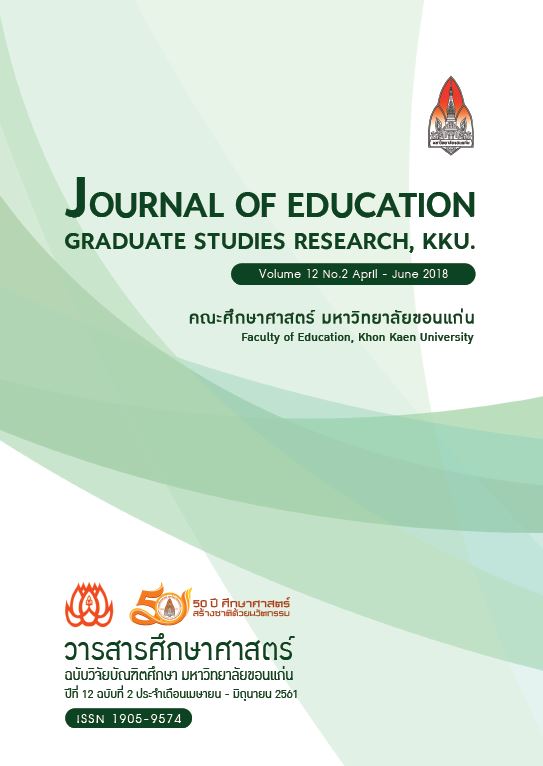Multiple Correlation between Ethical Leadership of School Principals and Teachers’ Teaching Behaviors under The Office of Secondary Educational Service Area 25
Main Article Content
Abstract
This research is descriptive research. The purposes of research were to study 1) the level of ethical leadership of school principals under the Office of Secondary Educational Service Area 25, 2) the level of teachers’ teaching behaviors, and 3) the relationship between ethical leadership of school principals and teaching behaviors of teachers in these schools. The population of this research included 84 school principals and 3,726 teachers, the total 3,810 persons. The sampling groups were 435 persons including 84 school principals which were selected through stratified sampling method. Research instrument was a questionnaire. Data was analyzed by using a computer program for figuring out mean, percentage, standard deviation, and Pearson product-moment correlation coefficient. Findings were as follows: 1) Overall and each aspect of ethical leadership of school principals under the Office of Secondary Educational Service Area 25 indicated a high level action. Their mean scores could be respectively ranked from high to low as follows: responsibility, good citizenship, respect, justice, and trustworthiness. 2) Overall and each aspect of teachers’ teaching behaviors indicated a high level action. Their mean scores could be respectively ranked from high to low as follows: classroom management, measurement and evaluation, student-centered activity management, use of media and technology, and classroom research. 3) The multiple correlation coefficient between ethical leadership of school principals and teachers’ teaching behaviors indicated a moderate level of positive relationship (r=0.436) with a statistical significance at the .01 level. 4) The multiple correlation between the 6 aspects of ethical leadership of school principals (trust, respect, responsibility, justice, generosity, and good citizenship) and teaching behaviors of teachers indicated the “r” equals 0.501 (r = 0.501) which could correctly predict the teaching behaviors of teachers at 25.10%. It could be concluded that the relationship of the 6 factors of ethical leadership of school principals and teaching behaviors of teachers was found with statistical significance at .01 level.
Article Details
References
กรมประชาสัมพันธ์. (2557). ประเทศไทยกับอาเซียน. กรุงเทพฯ: กรมประชาสัมพันธ์.
พิทยา แสงแผ้ว. (2553). ภาวะผู้นำ คุณธรรมและจริยธรรม สำหรับผู้บริหาร. ค้นเมื่อ 20 พฤศจิกายน 2557, จาก https://www.gotoknow.org/posts/377556
พิมพ์วลัญช์ นันทัยทวีกุล. (2557). ภาวะผู้นำของผู้บริหารสถานศึกษาและพฤติกรรมการสอน ของครูที่ส่งผลต่อประสิทธิภาพการสอนของครูในโรงเรียน สังกัดสำนักงานเขตพื้นที่ การศึกษาประถมศึกษาขอนแก่น เขต 5. วิทยานิพนธ์ศึกษาศาสตรมหาบัณฑิต สาขาวิชาการบริหารการศึกษา บัณฑิต วิทยาลัย มหาวิทยาลัยขอนแก่น.
ละอองดาว ปะโพธิง. (2554). ความสัมพันธ์ระหว่างภาวะผู้นำทางวิชาการของผู้บริหารสถานศึกษากับพฤติกรรมการสอนที่มีประสิทธิผลของครูในสถานศึกษาระดับมัธยมศึกษา สังกัดสานักงานเขตพื้นที่การศึกษามัธยมศึกษา จังหวัดเลย. วิทยานิพนธ์ศึกษาศาสตรมหาบัณฑิต แขนงวิชาบริหารการศึกษา สาขาวิชาศึกษาศาสตร์ บัณฑิตวิทยาลัย มหาวิทยาลัยสุโขทัยธรรมาธิราช.
สุเทพ พงศ์ศรีวัฒน์. (2550). ภาวะความเป็นผู้นำ. กรุงเทพฯ: ส.เอเชียเพรส.
สำนักข่าวผู้จัดการออนไลน์. (2560). ดัชนีคอร์รัปชั่น CPI ปี 2559. ค้นเมื่อ 2 กุมภาพันธ์, 2560, จาก https://www.nacc.go.th/download/article/article_20170124170823.pdf
อินแปลง อบอุ่น. (2559). ภาวะผู้นำโรงเรียนที่ส่งผลต่อประสิทธิผลการพัฒนาวิชาชีพครูในโรงเรียนสังกัดสำนักงานเขตพื้นที่การศึกษามัธยมศึกษา เขต 25. วิทยานิพนธ์ ศึกษาศาสตรมหาบัณฑิต สาขาวิชา การบริหารการศึกษา บัณฑิตวิทยาลัยมหาวิทยาลัยขอนแก่น.
Karakose, T. (2007). High School Teachers’ Perceptions Towards Principals’ Ethical Leadership in Turkey. Retrieved October 15, 2014, Form http://www.springerlink.com/content/56vm 76047005004w.
Ponnu, C. H. & Tennakoon, G. (2009). The Association Between Ethical Leadership and Employee Outcomes–the Malaysian Case. Retrieved December 15, 2014, form http://ejbo.jyu.fi.

